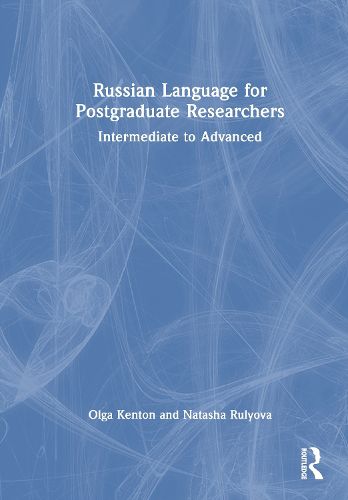Readings Newsletter
Become a Readings Member to make your shopping experience even easier.
Sign in or sign up for free!
You’re not far away from qualifying for FREE standard shipping within Australia
You’ve qualified for FREE standard shipping within Australia
The cart is loading…






Russian Language for Postgraduate Researchers is specifically designed for postgraduate students whose research is focused on the history, society, or culture of Russian-speaking communities around the world. 23 chapters of the textbook focuse on a wide range of topics including Soviet and post-Soviet identities, masculinities and femininities, LGBTQ, migration, ethnic diversity, public health, environment, and rewriting history. Many texts have been adapted from Russian-language research articles and lectures by Russian-language scholars to familiarize students with contemporary academic Russian. The textbook also contains practical activities, lists of active vocabulary, and grammar tasks. Upon the completion of the textbook, students will learn how to analyse, translate, and summarise texts in different genres and registers; they will expand their specialist vocabulary, deepen their understanding of complex grammatical structures, and improve their communicative skills. A unique feature of this textbook is that each chapter has a 'How To' section which has practical tips on how to conduct research in Russian-speaking countries. The textbook can be used in class or for self-study and is ideally suited to students who have already reached a B1 level (CEFR)/ Intermediate Low-Mid (ACTFL) proficiency and who wish to improve their command of Russian up to B2/C1 (CEFR)/Intermediate-High to Advanced-High (ACTFL).
$9.00 standard shipping within Australia
FREE standard shipping within Australia for orders over $100.00
Express & International shipping calculated at checkout
Russian Language for Postgraduate Researchers is specifically designed for postgraduate students whose research is focused on the history, society, or culture of Russian-speaking communities around the world. 23 chapters of the textbook focuse on a wide range of topics including Soviet and post-Soviet identities, masculinities and femininities, LGBTQ, migration, ethnic diversity, public health, environment, and rewriting history. Many texts have been adapted from Russian-language research articles and lectures by Russian-language scholars to familiarize students with contemporary academic Russian. The textbook also contains practical activities, lists of active vocabulary, and grammar tasks. Upon the completion of the textbook, students will learn how to analyse, translate, and summarise texts in different genres and registers; they will expand their specialist vocabulary, deepen their understanding of complex grammatical structures, and improve their communicative skills. A unique feature of this textbook is that each chapter has a 'How To' section which has practical tips on how to conduct research in Russian-speaking countries. The textbook can be used in class or for self-study and is ideally suited to students who have already reached a B1 level (CEFR)/ Intermediate Low-Mid (ACTFL) proficiency and who wish to improve their command of Russian up to B2/C1 (CEFR)/Intermediate-High to Advanced-High (ACTFL).